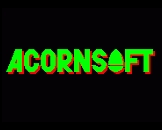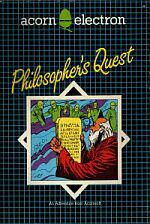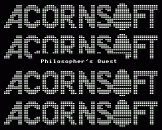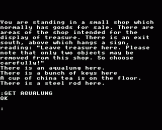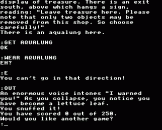Introduction
Welcome to the adventure! This pack contains programs on cassette plus instructions for Philosopher's Quest, an 'intelligent' adventure where the player explores a strange land full of weird and unlikely things, some dangerous and some even magical.
In this new and authentic game the concept of the adventure is exploited to the full, and extended to include abstract thought as a means to progress and survival. However, wild speculation will get you nowhere - you have to use your wits!
The objective is to find all the treasures and bring them to where you began, but in the meantime you have to sift clues, weigh up risks, spot magic words and remember which way you came!
The game starts with a description of your immediate surroundings, and a choice of objects which you can take with you (use "TAKE" followed by the name of the object) on your quest. Choose carefully, before setting off with a command such as "WEST" if you want to try going west, or "NE" to go to the northeast.
The computer becomes your eyes and hands. It will tell you what you can see and what is happening around you. You must tell it, in return, what to do (it prompts you with a colon). Use commands of one or two words (in upper case).
The computer only looks at the first four letters of any word you type, so that the command "NORTHEAST" must be typed in as "NE" to distinguish it from "NORTH" (or "N" - there are various abbreviations you will pick up as you go).
Some General Advice
- Tunnels bend sometimes, so going north from one room doesn't necessarily involve entering the next room from the south.
- Most areas are not lit, and moving in the dark is rather dangerous, so you'll need a light source. Some objects (and treasures!) can have special properties, as you'll find out: some of them are a help and some a hindrance. Nothing in the game is a red herring so read all the text carefully for clues to other puzzles.
- Eating and drinking are not allowed by order. "Eh?" means the computer doesn't understand you and you should try saying something else.
Useful Words
Part of the fun is finding out what words are understood! However, a short list of those you might not guess is given here:
- To move in some direction, try something like MOVE UP, CLIMB, SOUTH, RUN.
- To get or drop a book, for example, try "GET BOOK", "TAKE BOOK", "DROP BOOK" etc. GET, TAKE and DROP alone pick or drop the first object the computer sees.
- To get a full description of the room you are in, use "LOOK".
- To get a list of your possessions, use INV (inventory).
- ON and OFF may be useful (hint).
- To stop altogether, use "Q", "QUIT" or "STOP".
- To SAVE a game for later, use "SAVE" (See above).
Score
During the game you can display your score at any time by entering "SCORE" and pressing RETURN. Finding treasures will earn you points as will depositing them in the shop, and you will gradually discover other ways of gaining points - there may be some surprises here!
The maximum score is 250; consider yourself a philosopher if you score over 200!
Hints And Answers
Due to pressure of work, your chief philosopher is unable to answer your query in person. However, he has written out a list of the most commonly asked questions, together with a set of hints and answers.
Problem: I need more than two items out of the stop.
Hint: If you can't carry any more than two items out, how else could you get something out?
Answer: Try throwing something.
Problem: I die outside the shop/it's dark and I don't know what to do.
Hint: You need a light course. One is provided, and the game is fair!
Answer: Try "GET" and then "INV" outside the shop.
Problem: I can't get past the wall-crusher.
Hint: You need to wedge the walls apart with something strong, without going there yourself.
Answer: Try throwing the steel rod.
Problem: I can't get pas the cheese/I keep dying with the cheese.
Hint: You need something to ease the smell.
Answer: Look for a gas mask.
Problem: I can't get past the portcullis.
Hint: You need some magic. Try waving or rubbing things.
Answer: Rub the amulet.
Problem: I keep dying/falling into pits (in the Danger Room).
Hint: How would you avoid such danger in real life?
Answer: Experiment with JUMP, RUN, CRAWL, etc.
Problem: I'm trapped in the "you don't exist" state.
Hint: How can you prove you exist? How did the philosophers do it?
Answer: Try thinking.
Problem: I can't put the albatross down.
Hint: Neither could the mariner till he found someone (you) to tell the story to. Can you find someone?
Answer: Don't do the M.E. passage till you get the albatross.
Problem: I can't see how to get the albatross without running my lamp down.
Hint: Better not to have it on!
Answer: Turn your lamp off, strike a match and move.
Problem: I lose everything when I don't exist.
Hint: So don't have anything when you go in there.Hint: 43
Answer: Leave your lamp (on) and all your belongings behind and collect them later.
Problem: I get lost in the mazes.
Hint: The rooms look all alike, don't they? How can you make them not
look alike?
Answer: Drop an object in each room and map the maze.
Problem: I get squashed by elephants.
Hint: How could you scare the elephant away?
Answer: Take the mouse with you.
Problem: I can't get the mouse.
Hint: What do mice like?
Answer: Hold the cheese while you do it.
Problem: The old lady keeps dying because I can't get her tea out of the shop.
Hint: Where do old ladies keep their tea?
Answer: Leave it there and check her larder.
Problem: I can't find the (first) dog.
Hint: There are two other animals - where are they?
Answer: Past the elephants graveyard - but not till after tea.
Problem: I can't find the (second) dog.
Hint: Try calling it in a suitable place.
Answer: "SPOT" north of the Danger room.
Problem: I can't find the (third) dog.
Hint: Can you hear it near where it lives?
Answer: "GET" or "GET DOG" in kennel room.
Problem: How do I make the dog visible?
Hint: Try coating it with something sticky.
Answer: Take the dog under the paint-dropper.
Problem: The will isn't worth anything.
Hint: No, it's only a piece of paper, but it's probably valuable.
Answer: Take it to the solicitor's.
Problem: I drown when I try to swim.
Hint: You need proper preparation.
Answer: Take the aqualung with you.
Problem: I can't find anything in the sea.
Answer: Go down and south as far as you can.
Problem: I keep dying by the octopus.
Hint: What defence mechanism do octopi have?
Answer: Give him the ink.
Problem: I can't map the whale's stomach.
Hint: No, you can't, as you enter it randomly and things get moved about.
Remember what the octopus said.
Answer: Strike a match; see which way the wind's coming from - that must be out!
Problem: I die when I take the tooth.
Hint: The whale hates smoke.
Answer: Strike a match and light a fire with the driftwood.
Problem: I get the bends and die.
Hint: How do divers solve the problem?
Answer: Every turn you spend at mid-depth "removes" five turns you spent at depth. When you're "removed" them all you can surface safely.
Problem: I can't get the last point; I've got 249 out of 250.
Hint: Recall the instructions; nothing is a red herring.
Answer: "Blach" never achieved anything before; try it now.
Loading
To load and run the program, place the cassette (fully rewound) in the cassette recorder and type:
CHAIN ""
and press RETURN; the 'Searching' message should appear on the screen as you do this. Now press the PLAY button on the cassette recorder and wait for the program to load. The title page will load in less than one minute and the main program will take a further four minutes to load. Once loaded, you will be prompted to 'Position the database file'. This refers to the dynamic part of the database which attends to the general housekeeping (where you are, where the objects are, etc). This file is called INIT and the tarting version is provided just after QUEST on the cassette. So to load INIT, simply leave the cassette playing. Once INIT is loaded in (loading takes about 15 seconds) the game will start.
Should you decide to SAVE a game, with the intention of returning to it later, you will be prompted to find a suitable area on one of your cassettes followed by the usual 'RECORD then RETURN' message. This will put the dynamic part of the database on to cassette, called INIT again, so you'll need to keep track of which SAVE is where. If you restart on one of these (separately saved) games, you should load this instead of the original INIT file.
Should you QUIT or die, you'll be asked if you want another game. Y will require you to reload whichever INIT you wish to supply. N will simply end.
